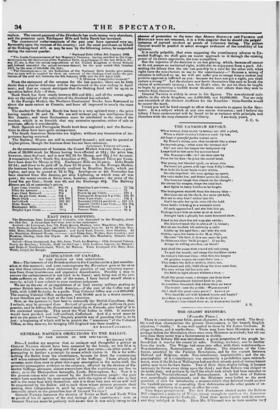GENERAL NAPIER'S OBJECTIONS TO THE BALLOT.
TO THE EDITOR OF THE SPEC:TATOU.
4th January le38.
SIR—I confess my surprise that so eminent and thoughtful a patriot as General NAPIER should have been ensnared by the heresy, no less fake in politics than in morals, of doing evil that good may come,—in other words, of attempting to further a principle by means which violate it. He is fur with- holding the Ballot from the constituency, because lie fears the constituency will when enfranchised refuse extension of the Suffrage. I have already had occasion more than once to place this vague assumption in the scales with the powerful presumptive evidence to the contrary, afforded by the election of Ex- tended Suffrage advocates almost everywhere that the constituency are free to elect ; as in the Metropolitan boroughs, Leeds, Birmingham, &c. Now it is the poorest voters who are coerced by the Anti-Extension people : the poor voters have manifestly the most sympathy with the rights of those who in fact sail in the same boat with themselves, and it is these very men whose will will be empowered by the Ballot : add to such those whose poverty prevents their putting their independence in peril by registration, and what right can we rationally attach to the groundless fear of General NAPIER? General NAPIER instances the election of Tories at Bath and North Wilts as proofs of his ill opinion of the real feelings of the constituency : now, as General Narlita must be perfectly well awme that it was solely owing to the abeenee of protection to the voter that Messrs Roznucx and RIMER and METHUEN were not returned, it is a little singular that he should cite palpabl instances of coerced conduct as proofs of voluntary feeling. The gallant General would be puzzled to select stronger evidences of the invalidity of hie opinions. It is surely palpable, that even supposing the constituency adverse to Ex.. tended Suffrage, we shall gain MI nearer approach to it through the existing power of its sworn opponents, the vote. compeller'. But the injustice of the doctrine is no less glaring, which, because all cannot or do not possess an universal right, withholds its enjoyment from a part. Ad- mitting the fallacy that the one can possibly be a cure for the other evil, what right have the non-electors to say to the constituency—" Because a wrong of omission is inflicted on us, we will not suffer you to escape from a violent and positive oppression inflicted on you : because we have not got a right, you shall endure a wrong?" Let the electors now bestir themselves like men to break the chains of aristocratic tyranny ; but, for God's sake, do not let them be taught to begin by protecting a tenfold worse thraldom over others than they seek to remove from themselves.
General NAPIER is widely in error in his figures. The non-electoral male adults, in the whole kingdom, are 5,000,000, not 10,000,000. Nor are only one-twentieth of the electors creditors fiur the franchise: three-fourths would be nearer the mark.
I trust you will he kind enough to allow these remarks to appear is the Spec. tator. It is a subject which at any rate merits discussion ; and I believe the fallacy I have controverted will be found to be at variance with principle, and
therefore with the very elements of all liberty. I am truly yours,
J. C. S.


























 Previous page
Previous page